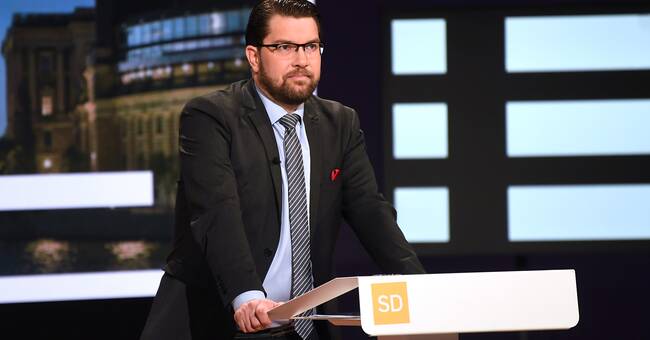Ahead of the party leader debate, the Moderates, Christian Democrats, Sweden Democrats and Liberals presented a joint debate article in DN.
In the article, they point out 20 points where they agree on measures against serious crime, including preventive wiretapping, extended camera surveillance and anonymous witnesses.
The consensus was also clearly felt in the debate where the opposition parties on the right jointly attacked the government for not doing enough.
Moderate leader Ulf Kristersson also emphasized that the parties in his constellation also agree on nuclear power and to reduce immigration.
Increasingly united opposition
It also emerged from the debate that the opposition also sees high unemployment as, above all, an integration problem.
The independent school debate also showed that they agree that owners of independent schools should be able to continue to withdraw profits from their operations.
And that nuclear power can be expanded to cope with the electricity supply.
But it was not just about the concrete proposals.
The party leaders' entire body language testified that Jimmie Åkesson is now definitely one of the gang.
Nodding applause during the debate and no real conflicts between these party leaders spoke their clear language.
Cooperating with the Sweden Democrats is no longer an issue for these parties.
Not even the Liberals' party leader Nyamko Sabuni trembled when she said that her party is now ready to cooperate with the Sweden Democrats.
Do not agree on the assistance
Thus, it is clear that Sunday night's debate marked another step in the formation of a new government alternative.
An alternative that in next year's election campaign will be set against the red-green government and its coalition parties.
But even if the opposition parties did everything to appear in agreement in Sunday night's debate, there are important issues where there are completely different positions.
One such is aid.
Nyamko Sabuni mentioned it in a side note, but the fact is that a significant part of both the Moderates 'and the Sweden Democrats' budget space is taken from large savings on aid.
The Liberals absolutely do not want that.
The parties also disagree with the unemployment insurance fund and the health insurance.
Here, for example, the Moderates want to cut back, which the Sweden Democrats say no to.
It is obvious, however, that these issues will not be dealt with during the autumn's budget work in the Riksdag.
Only if the opposition wins government power is it prepared to sit down here to try to compromise.
Incredibly even position in politics
And the election outcome next year is difficult to assess.
Right now, the situation is extremely even in Swedish politics.
It is an almost dead race between the government alternatives in public opinion.
This means that the fate of the small parties in next year's parliamentary elections can be directly decisive for the government.
If, for example, the Liberals leave the Riksdag, the Social Democrats' opportunities to retain government power increase, if the Green Party leaves, it benefits the parties on the right.
No matter what, Stefan Löfven is not left then as prime minister or party leader.
It was his last party leader debate and the next time it is time, it is probably the current Minister of Finance Magdalena Andersson who represents the Social Democrats.
What this means for the debate and the dynamics of Swedish politics, no one can answer today.

